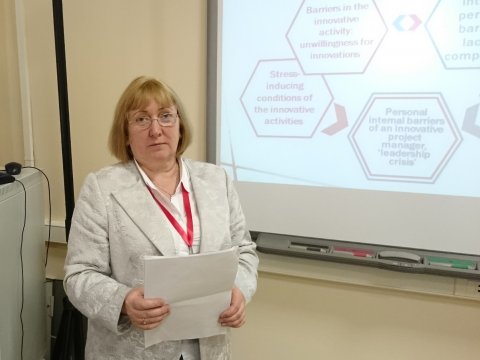Within the frameworks of psychological innovative auditing, South Ural State University researchers have developed a typology, which is based on leadership and management styles and aims at determining the optimal strategies for increasing both individual and team efficiency of managers. The results have been published in the highly-rated journal, "Smart Innovation, Systems and Technologies".
Relationship between Leadership and Management
The researchers from South Ural State University completed studies, which aimed to determine leadership and management styles among managers of innovative and modernized businesses in the Ural Region. The staff of the Laboratory of Developmental Psychology and Psychophysiology of Stress Resistance and Creativity of the SUSU School of Medical Biology have developed a typology based on the relationship between leadership styles and management.
“We conducted a study on 254 managers working in several businesses of the Ural Region with various levels of modernization, using the questionnaires MLQ created by B. Bass and B. Avolio, and MSI created by I. Adizes. We faced the task of determining the readiness of managers to changes, implementation of innovations, and learning new skills. Within the innovative auditing program, we completed psychological diagnostics on managers involved in or leading innovative project teams. In team leadership, the Meyers-Briggs classification system is used. It is based on the diverse range of mental functions found in individuals. In this system, among the 16 types, just a small portion are managers. We proposed a classification based on the variety of management and leadership styles. As a result, we justified a more broad typology based on differentiating between various types of managers,” says the project manager, Doctor of Sciences (Psychology) Vera Gryazeva-Dobshinskaya.
Types of Managers and Changes Management Teams
The results of this study were presented at the Far East Con International Scientific Conference on industrial engineering and modern technologies, and published in the highly-rated journal "Smart Innovation, Systems and Technologies".
“On the one hand, according to the Multifactor Leadership Questionnaire by B. Bass, we determined the "leaders of changes" with a high level of transformational leadership, i.e. those who can lead and innovate, and "leaders of transactions" with a high level of transactional leadership, those who are able to negotiate and manage on the basis of mutual agreement. On the other hand, we used the concept of management styles by I. Adizes, which is aimed at determining different management styles. The universal functions of management ("production", "entrepreneurship", "administration", and "integration") are expressed differently in various managers, which determines their management style. For this reason, you need a differential approach to identify individual management priorities. These methods are widely used in foreign research and practice of personnel management, however, unlike the method of I. Adizes, the Multifactor Leadership Questionnaire is practically never used in Russia. As part of our study, we were able to establish which personality traits determine the readiness of a manager to manage changes and their resources for further training," explains Yulia Dmitrieva, a researcher of the SUSU laboratory.
.jpg)
Photo: researcher of the SUSU Laboratory of Developmental Psychology and Psychophysiology of Stress Resistance and Creativity Yulia Dmitrieva
The final version of the typology includes 16 types of managers, differentiated by 2 style indicators of leadership (transformational and transactional) and 2 indicators of management (strategic attitudes to efficiency and productivity).
With the help of methods of mathematical statistics and modelling, a model for determining different types of managers was developed and tested. The greatest contribution to this differentiation are the management style indicators, all the strategic management attitudes, as well as styles of transformational and transactional leadership. The "universal leader/efficient manager" and "efficient manager" types were seen the most in the studied organisations, while "leader of transactions"," universal manager" and "absolute leader/manager" were seen the least.
This mathematical formula for identifying the leader and manager types, which was tested on a large sample, provides a basis for determining manager types based only on the data of individual psychological diagnosis. This data can be used by business leaders to effectively select managers for different tasks when making changes in the organisation, or for hiring and training.




